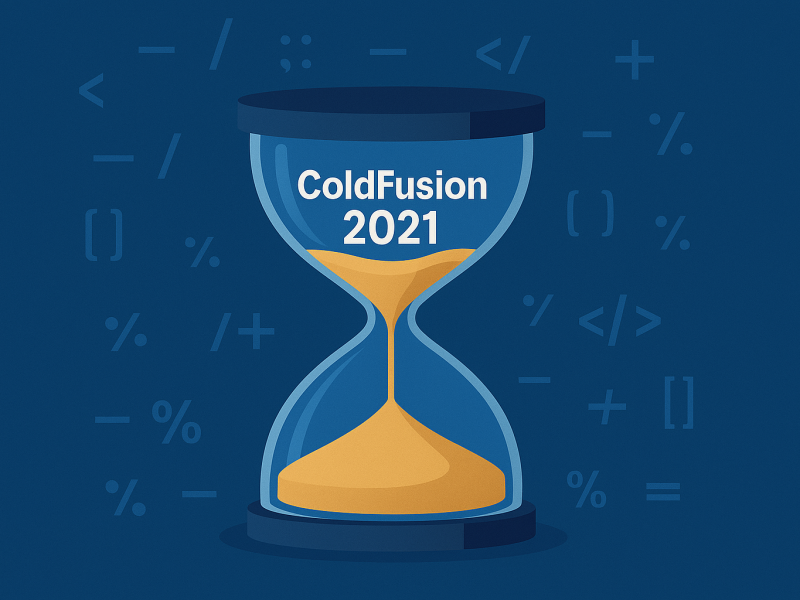At a high level, ColdFusion hosting is any cloud based server or service specifically configured to support Adobe ColdFusion applications. ColdFusion is a rapid web-application development platform that uses ColdFusion Markup Language (CFML) to simplify the creation of dynamic websites and applications. Hosting providers offer various environments optimized for ColdFusion to ensure optimal performance, security, and scalability.
Types of ColdFusion Hosting
1. Cloud Server Hosting
ColdFusion cloud hosting or VPS hosting provides a virtualized environment where a server’s resources are divided among multiple users, but they are dedicated to each customer. This gives customers more control and customization and most closely matches OnPrem servers. This setup is suitable for medium-sized applications requiring better performance and security. To ensure optimal performance and security, it’s advisable to engage a managed hosting provider. Managed VPS hosting services handle essential tasks such as regular software updates, security patching, and continuous server monitoring.
2. Public Cloud ColdFusion Hosting (AWS/Azure/GCP)
Public cloud platforms like Amazon Web Services (AWS), Microsoft Azure, and Google Cloud Platform (GCP) offer robust, scalable environments ideal for hosting ColdFusion applications. These providers deliver a suite of services—including virtual machines, managed databases, and global content delivery networks—that enable developers to deploy and manage ColdFusion applications efficiently. However, effectively leveraging these platforms often requires significant technical expertise and development effort.
3. Shared ColdFusion Hosting
Shared hosting involves multiple websites residing on a single server, sharing its resources. While this is a cost-effective option, it often comes with limitations in performance, security, and customization. We recently highlighted the shortcomings of shared ColdFusion hosting, emphasizing issues like resource contention and lack of specialized support.
4. Dedicated Server Hosting
Dedicated hosting involves leasing an entire physical server exclusively for one user or organization. This option offers maximum control, customization, and performance, making it ideal for resource-intensive or mission-critical applications. But, because you control everything, you are also responsible for all backups and redundancy. Because of this, many opt for colocation of their own servers if they need dedicated servers for any longer length of time.
How to Select the Best Hosting Provider
When you’re looking beyond simply what type of hosting (VPS, cloud, dedicated) to choose and want to select the right vendor, you’ll want to evaluate far more than just price. Below is a rigorous framing with some skeptical questions and criteria to ensure you pick a partner that will truly support your needs.
Selecting the appropriate ColdFusion hosting depends on factors like application size, performance requirements, budget, and technical expertise. While shared hosting may suffice for small projects, larger applications benefit from the enhanced performance and security of VPS, dedicated, or cloud hosting solutions.
1. Define Your Requirements (so you match the provider to what you need)
Assumptions to challenge:
- Many assume “any hosting” will work if the specs are met (CPU, RAM, disk). But you must also match application architecture, growth trajectory, technical support requirements, and compliance/security demands.
- You might assume ColdFusion apps are “just like any other” web apps, but in reality, they often require specialized support (CFML engine versions, Java tuning, scheduler tasks, etc.).
- You might assume your future scale is linear, but growth can be unpredictable. A provider that works at small scale may fail when you spike.
Checklist items:
- What is your current workload (traffic, concurrent users, transaction volume)?
- What is your expected growth over next 12-24 months?
- Does your app use any special ColdFusion features (CFML modules, legacy CF versions, scheduled jobs, integrations) that demand vendor expertise?
- Are there compliance/regulatory needs (HIPAA, PCI, data sovereignty) that the provider must meet?
- What level of uptime and performance do you need (rather than “would be nice”)?
- What is your budget – both now and realistically when you scale?
2. Evaluate Reliability & Performance
Skeptic’s viewpoint:
- “Uptime %” claims are often optimistic; many providers bury exceptions or have frequent “maintenance windows.”
- Performance depends on more than raw specs: network architecture, latency, IO speed, resource isolation (especially in shared crowded environments) matter.
- ColdFusion apps may be CPU- or Java-memory‐intensive; provider must have visibility into tuning these.
What to ask/verify:
- What is the provider’s SLA (service-level agreement) for availability? What happens if they fail?
- Do they provide real-time status/dashboards for network & server health?
- What is their network latency to your user base (or CDN options)?
- What underlying storage types do they use (e.g., NVMe vs. spinning disks)?
- For ColdFusion specifically: Do they support efficient JVM tuning, CFML engine upgrades, session management best practices?
3. Security, Compliance and Support
Assumptions to challenge:
- “My provider is secure” doesn’t mean your application is secure. A host may provide infrastructure security but not CF-specific patching, or may not secure the CFML engine properly.
- Support often gets overlooked (especially for platform specific issues). Many hosts are great for generic LAMP stacks but weak for ColdFusion.
- Compliance (HIPAA, PCI) often adds complexity (audit logs, encryption at rest, etc.) but many providers say “we’ll help” without specifics.
Questions to probe:
- What is the patching cycle? Does the provider patch not only OS but also ColdFusion engine, Java, relevant libraries?
- Do they provide firewalls, intrusion detection, DDoS protection?
- Can they support application-level access (CFML, scheduled tasks, connectors) or only infrastructure?
- For compliance: Are they audited (SOC2, ISO 27001)? Can they provide documentation?
- What are their support hours? What is the escalation process? Are ColdFusion specialists available, or just generic sysadmins?
4. Scalability & Flexibility
Skeptic’s view:
- Some providers lock you into rigid tiers or make scaling painful (downtime, migration costs).
- Particularly for CF apps: you may need vertical scaling (more CPU/memory) and horizontal scaling (multiple CF servers, load-balanced) which many hosts don’t support out-of-the-box.
- You may assume you’ll only have one server; but future growth might require architecture changes (clustered CF servers, dedicated DB, separation of concerns).
What to evaluate:
- Does the provider support both vertical and horizontal scaling?
- Can you scale seamlessly (automatically or with minimal effort)?
- How easy is migration between tiers or to different architectures?
- For ColdFusion: Do they support multi-server CF implementations, session replication, clustered caching?
- Are there lock-in risks (proprietary tooling, high migration costs)?
- Does the provider offer managed services that can evolve as you grow?
5. Cost / Value & Hidden Considerations
What to challenge:
- Lower cost often means compromises (poorer support, no tuning for ColdFusion, shared noisy neighbours).
- Future costs (scaling, licensing upgrades, migrations, add-ons) are often ignored in initial budgeting.
- Terms and conditions can hide “extra” charges for support, backups, migrations, bandwidth overages.
Checklist:
- What is included in the base price (support, backups, monitoring, ColdFusion optimisations)?
- Are there charges for migrations, setting up, scaling, or for technical assistance beyond “basic”?
- What are license implications (ColdFusion engine versions, Java, OS)?
- Is the vendor transparent about future cost increases when you grow?
- How do your total ownership costs compare (not just monthly hosting, but time/effort saved by good support) — in other words, value.
Final Thoughts
Selecting a hosting provider isn’t just about choosing between VPS, cloud, or dedicated (which you already cover well in the earlier blog). The real decision lies in matching the provider to your application’s architecture, growth path, and support needs – especially when it includes a specialized stack like ColdFusion.
The most common failure points aren’t hardware. They’re mismatched support, poorly tuned environments, hidden future costs, and inflexible scaling. A skeptical buyer asks the right questions today, ensuring the partner they select won’t become the bottleneck tomorrow.
For those seeking a robust and scalable environment, xByte Cloud’s managed ColdFusion cloud hosting and managed public cloud services offer expert-managed services tailored to meet diverse needs.
By understanding the different hosting options and their respective advantages, you can make an informed decision that aligns with your application’s requirements and growth plans.


